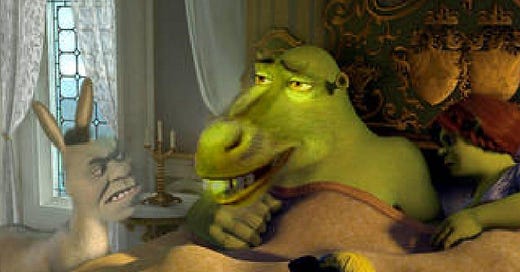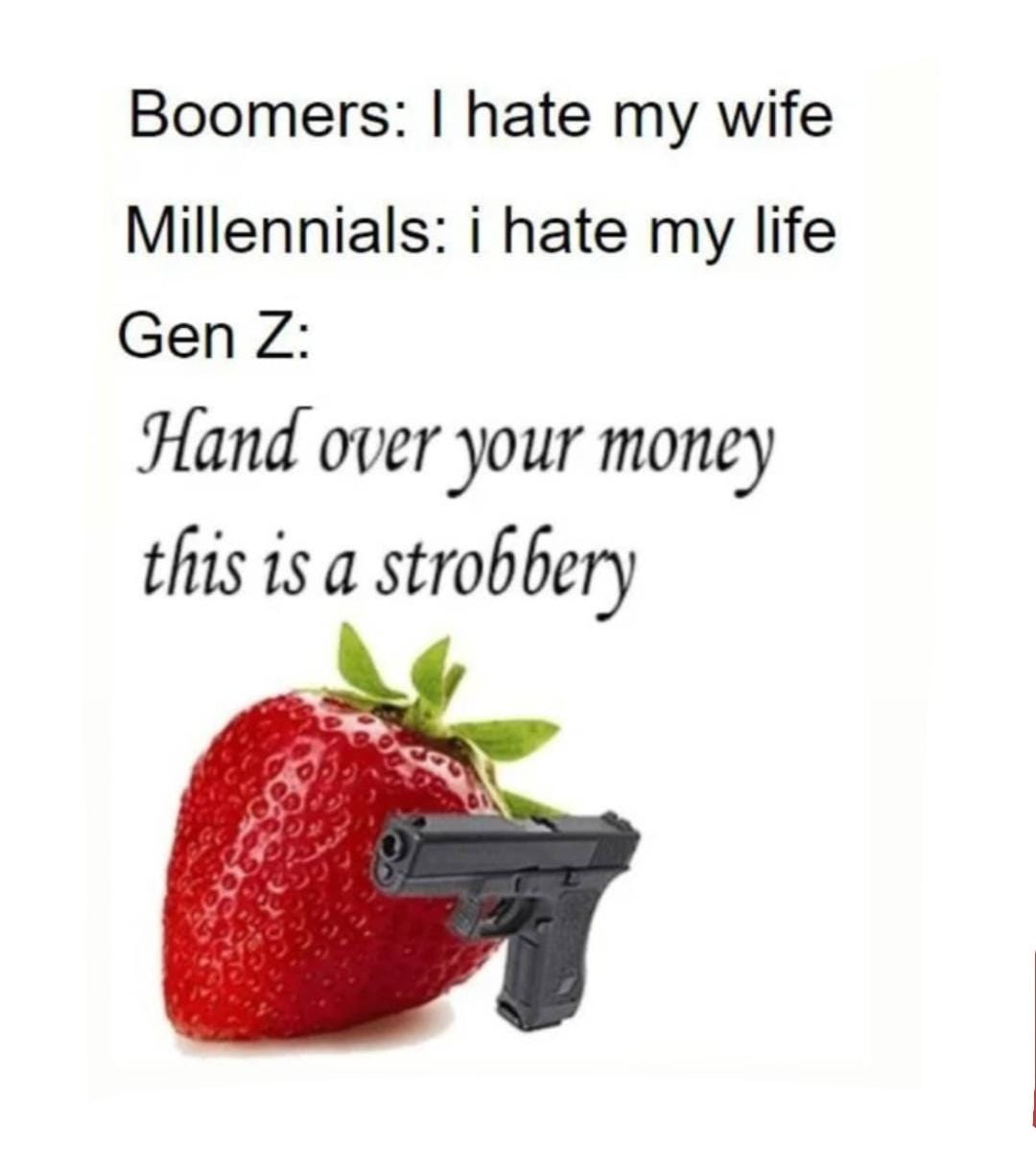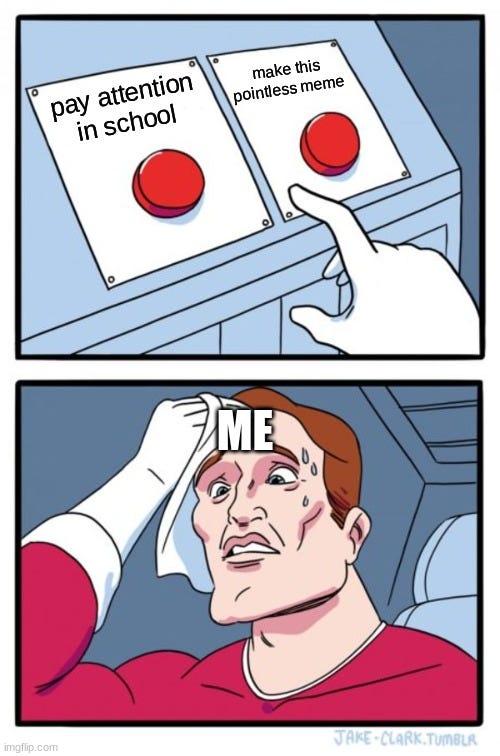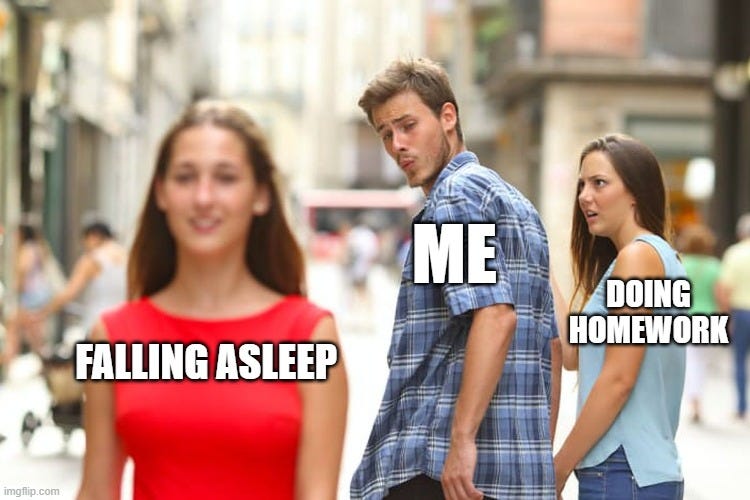You have just been subject to a small gallery of Generation Z memes. I’m sorry you didn’t have more warning.
Gen Z memes are incredibly bizarre, by any standard. The picture to the right demonstrates the comparison of memes between the four current generations. The memes of Gen X remind me most of what memes were originally like in the late 2000s when they first appeared. I assume that Gen X then tried using them and they quickly became unfashionable, even moreso when Boomers tried to create them and in reducing them to their bare elements enact a type of reduction of the meme format to something so primitive it can only be explained analogously to a Boomer who doesn’t know how to make a video full screen. So the millennial moved to a different type of meme: one focused on new formats and clever content.
Of the millennial memes there is almost a type of pantheon of formats that one can use. Indeed there are website with blank templates that you can use to create new memes of your own. Every so often a new, revolutionary meme template is added to the ranks, but it still is understandable: the new template has a joke specific to it. It’s gimmick works for some jokes but not for others. There is still an obvious form, the questions are just how far can you stretch that form; to what new situations can that form be applied; and what new forms may exist?
Gen Z abolishes the form completely. I was first exposed to the truly incoherent nature of Gen Z memes when I taught English in Florida. First they dismantled how I thought they interacted with memes and then they decimated all expectations of their meme-related humor. For a fun activity, I thought I would have students use the meme template websites I mentioned earlier to create memes about what we had read. I figured that if you can joke about something you must have some level of understanding. The students were completely perplexed at the meme formats. They had no idea what they were seeing or what the forms were that the templates presented. They didn’t know how to use them. I had assumed that as teenagers, this would be their language, but apparently they dealt with different memes than I did.
I ran a teacher Instagram and students could submit memes about Catholicism or English and I might share them on my feed. A student shared a front-profile picture of Matthew J. Fox’s Stuart Little, looking angry, with orange streaks around the perimeter of the photo with a caption saying “How dare you disturb silent reading.” This meme begs several questions, among them why Stuart Little? Why reference silent reading time, a relic from Elementary School? Why combine them? There are no easy explanations aside from the fact that the meme is funny. It defies explanation. An analogy I like to use is to compare millennial memes to well-shaped, sparkling diamonds, while Gen Z deals in raw gems straight from the earth. They are less shaped and refined, they have less snap, but they are seemingly just as precious. Look at the above example of the Gen Z meme compared to the other three memes: the caption “Italy” on a wavy blue background. There doesn’t even seem to be a joke! And yet, in a way, it is funny.
A theory I have is that these memes represent a central position of the Gen Z culture. Let us set aside the fact that it is remarkable that we can say anything about an entire generation without it having yet entered into a position of primacy. Gen Z’s humor, and generational disposition, is marked by two pillars: a rejection of established tradition, authority and ultimately, form; and an authentic desire genuineness and sincerity. The meme is an excellent way to understand this.
Gen Z’s memes defy any attempt for categorization. They borrow the bare minimum from their predecessors, words and image, and then do whatever the hell they want. This makes them extraordinarily bizarre, but also ultimately unique, which is something members of Gen Z crave: to be individuals of their own design, unique and self-created. They want to be creatures, not consumers, but what they make must be different, so the meme has no solid canon, as it does for the other generations.
Furthermore, their rejection of form is not only telling of their self-disposition, but the status of how they relate to everyone else. Gen X stole millennial memes and Boomers ruined it, so Millenials keep inventing new memes that go out of style as the older generations appropriate them and then make them uncool. Gen Z circumvents this problem entirely by making content that is so irreplicable that one cannot even attempt it. While searching for Gen Z memes, I found a Buzzfeed page collecting them, but already I knew I wasn’t looking entirely at Gen Z memes, because there was a common pattern emerging of distorted photos with phrases like “Gordon Ramses” under a mash-up of the sphinx and chef Gordon Ramsay; and “Vlad the Inhaler” under a mash-up of an inhaler and Vlad the impaler. My BS detection was going off: there was too much pattern for this to be authentic. Gen Z memes are funny in direct proportion to how much they break pattern. Any time form does appear, like the following:
It must immediately be dismantled, lest it start making too much sense:
The first one is funny if it’s unique, but it’s dangerous because it has obvious form, so those things must be challenged: now the picture does not relate, and it’s not even a picture of anything that actually exists; furthermore the meme refuses to actually follow the acrostic form, ignoring it entirely, but still makes an accurate joke about utilitarians. It makes no sense. But here is the distinct characteristic of Gen Z humor: it can’t be parodied further.
The incoherent nature of Gen Z memes inherently resists mimicry, parody, and appropriation. Older generations can’t take it, or imitate it, because the second they try, it falls apart: it’s no longer funny. It belongs entirely to those who make them and belong to the generation, because they alone can determine if it’s funny, based on an innate sense of genuineness. And herein lies the second principle of Gen Z identity and humor: it must be sincere.
While Gen Z has inherited much from the postmodernists, they ultimately reject its fundamental ideas of lack of value in the world. While they nominally may profess this, there isn’t a generation alive that cares more about what really matters. They are a generation of paradoxes: they are cynical about everything, but only because they won’t accept anything less than sincerity; they will mock everything, but only because they want something that can’t be mocked; their tool is irony to bring about sincerity. They are a generation who pushes postmodern methods as far as they may go, but with all authenticity of intention. It can’t be described, but it can be felt. In using these means for this end, perhaps they push us farther along the scope of literary theory, through the total deconstruction of everything to the point that cannot be deconstructed, so that there may be something indestructible that they can rely upon.
It is only a theory, but Gen Z is so weird, in the best possible way, that perhaps this is a way we can start to tell what it is exactly that they’re up to, and assist them on their quixotic quest of achieving ultimate meaning, in extraordinarily ridiculous and backwards ways.










